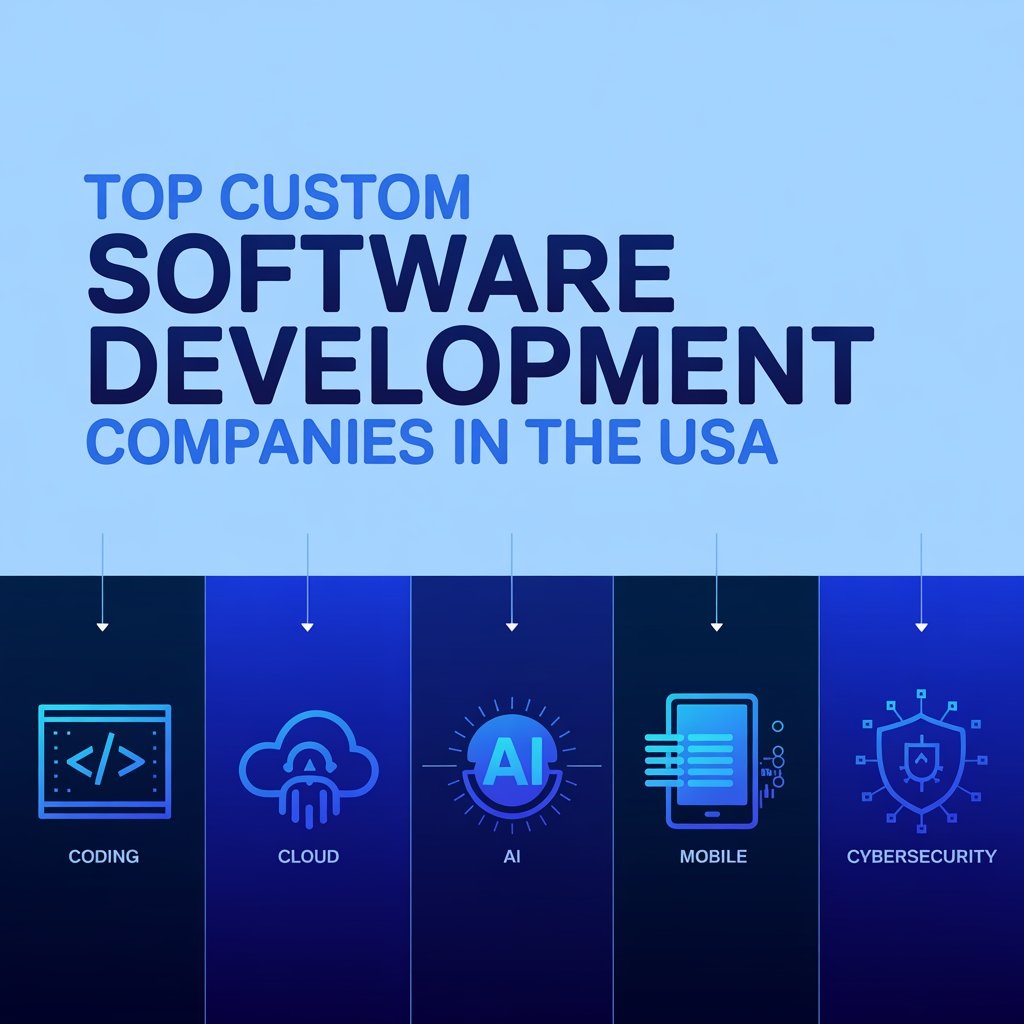Envision a world where a doctor can instantly evaluate a patient’s X-ray. Picture medical records effortlessly transferring between hospitals, erasing the worry of misplaced documents. This isn’t a scene from films — it’s the current reality made possible by the expanding array of medical software programs.
The healthcare industry is undergoing a digital revolution, with software playing a pivotal role in streamlining processes, improving patient care, and driving groundbreaking advancements. A recent study by Statista revealed that the global healthcare software market is expected to reach a staggering $109.50 billion by 2027, signifying the immense growth and importance of these digital tools.
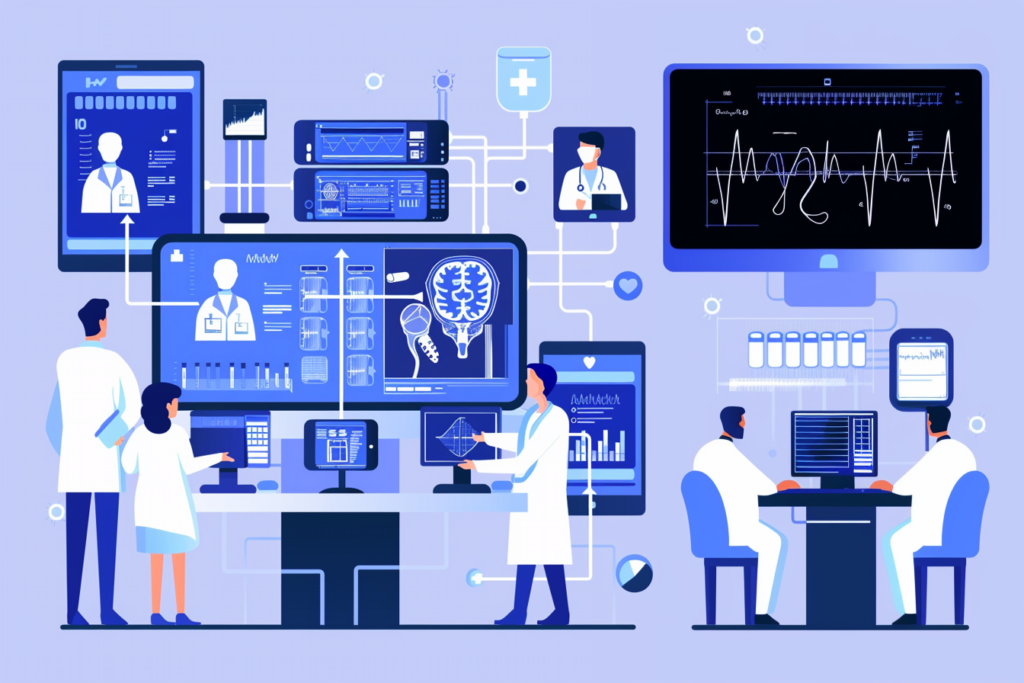
But with a plethora of medical software programs available, which ones are truly the workhorses driving the efficiency and innovation within hospitals and clinics? Delve deeper with us as we explore the most used medical software programs shaping the future of healthcare.
Innovations in Healthcare Technology
The healthcare industry is undergoing a transformative shift, fueled by the relentless march of technological innovation with Machine learning, cloud computing, and Artificial intelligence. These advancements are not merely bells and whistles; they are fundamentally altering the way we diagnose, treat, and manage health. Here’s a closer look at how technology is revolutionizing healthcare and the tangible benefits it delivers:
Enhanced Diagnostics and Precision Medicine:
Traditionally, diagnosis and treatment have relied on a generalized approach. However, technology like AI-powered medical imaging analysis and genetic testing is paving the way for precision medicine. This allows doctors to personalize treatment plans based on a patient’s unique genetic makeup and medical history, leading to more effective and targeted therapies.
Improved Efficiency and Streamlined Operations:
Electronic health records (EHRs) have become the cornerstone of efficient healthcare management. These digital systems centralize patient data, allowing seamless access for authorized healthcare providers and eliminating the need for cumbersome paper records. A study by the iAmerican Medical Association (AMA) revealed that EHRs can improve physician productivity by up to 20%.
Telehealth and Remote Patient Monitoring:
Telehealth consultations have become a game-changer, particularly in rural areas or for patients with mobility limitations. These virtual visits allow patients to connect with doctors remotely, improving access to care and reducing the burden on healthcare facilities.
Wearable Devices and Real-Time Health Data
Wearable health trackers and smart devices empower patients to take a more active role in their health management. These devices collect real-time data on heart rate, sleep patterns, and activity levels, allowing for early detection of potential health issues and proactive lifestyle changes. A study published in Nature Digital Medicine showed that wearable devices can effectively detect atrial fibrillation (a heart rhythm irregularity) with high accuracy.
Robotics and Minimally Invasive Surgery:
Robotic surgery has become a prominent tool in various medical specialties, offering surgeons enhanced precision during minimally invasive procedures. This translates to smaller incisions, faster recovery times, and reduced patient discomfort. The global market for surgical robots was valued at $3.92 billion in 2023 and is projected to expand at a compound annual growth rate (CAGR) of 9.5% from 2024 to 2030.
These are just a few examples of how technology is transforming healthcare. By embracing these innovations, the healthcare industry can deliver better patient outcomes, improve operational efficiency, and pave the way for a healthier future for all.
The Most Common Types of Healthcare Software
Now, we’ll delve into four of the most common types of software for healthcare and explore how they contribute to the well-being of patients and the success of healthcare facilities:
1.Hospital Management System (HMS)
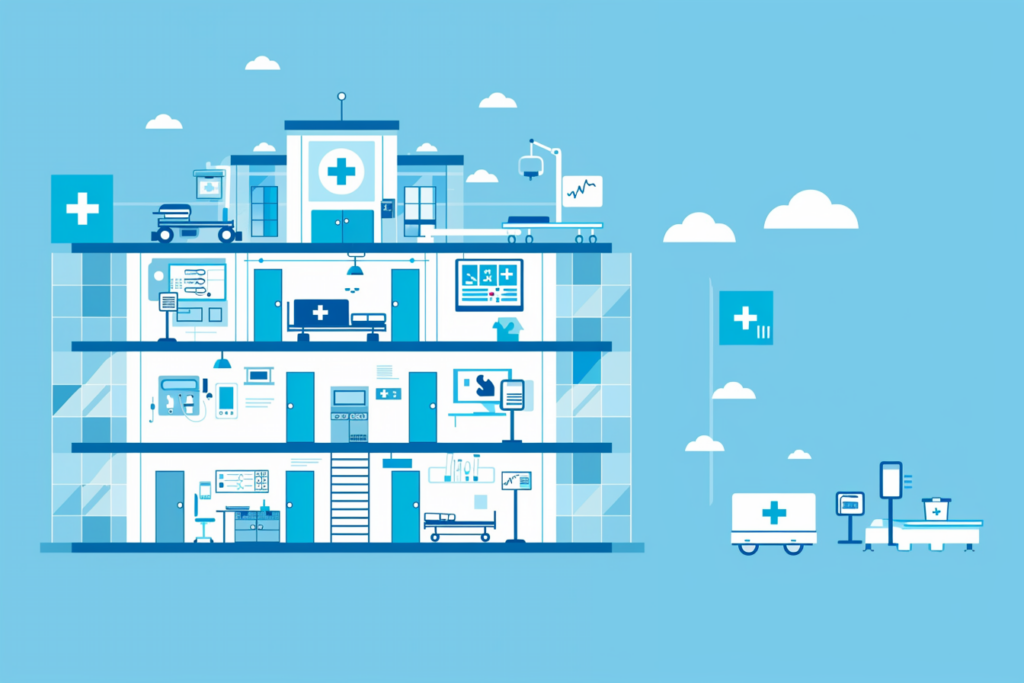
Imagine a hospital as a bustling orchestra, with countless departments working in intricate harmony. The HMS acts as the maestro, coordinating these diverse elements. This comprehensive software suite manages various administrative and operational functions, including:
- Patient Registration and Scheduling: Streamlining patient intake, appointment booking, and resource allocation.
- Billing and Insurance Management: Facilitating accurate medical billing and timely insurance reimbursements.
- Inventory Management: Tracking and managing medical supplies, pharmaceuticals, and equipment.
- Human Resource Management: Handling payroll, employee benefits, and staff scheduling. They can use an AI paystub generator to handle payroll, employee benefits, and staff scheduling.
An HMS empowers hospitals to operate efficiently, improve financial performance, and dedicate more resources to patient care.
2.Appointment Scheduling Software
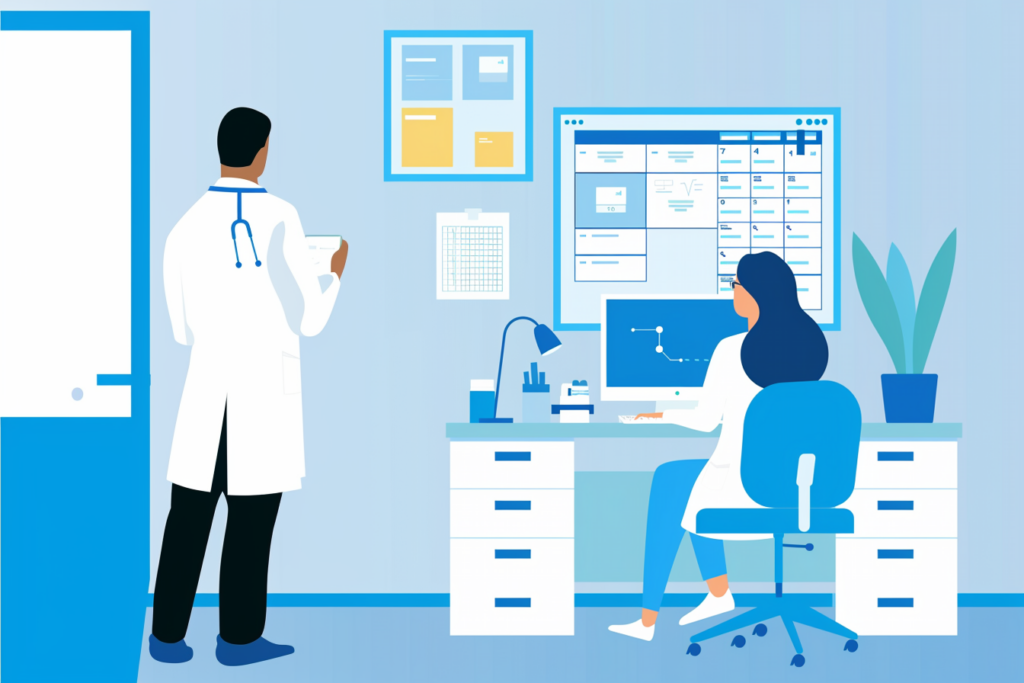
Just as a well-tuned orchestra requires precise timing, so does patient care. Appointment scheduling software ensures a smooth flow of patients by offering functionalities like:
- Online Appointment Booking: Allowing patients to conveniently schedule appointments 24/7, reducing phone traffic and wait times.
- Automated Reminders: Sending patients confirmation emails and SMS alerts, minimizing appointment no-shows.
- Integration with EHRs: Providing a centralized view of patient schedules and medical records, streamlining communication for healthcare providers.
By optimizing appointment scheduling, these medical software programs improve patient satisfaction, reduce administrative burden, and allow healthcare professionals to dedicate more time to each patient.
3.Electronic Health Record (EHR) Software
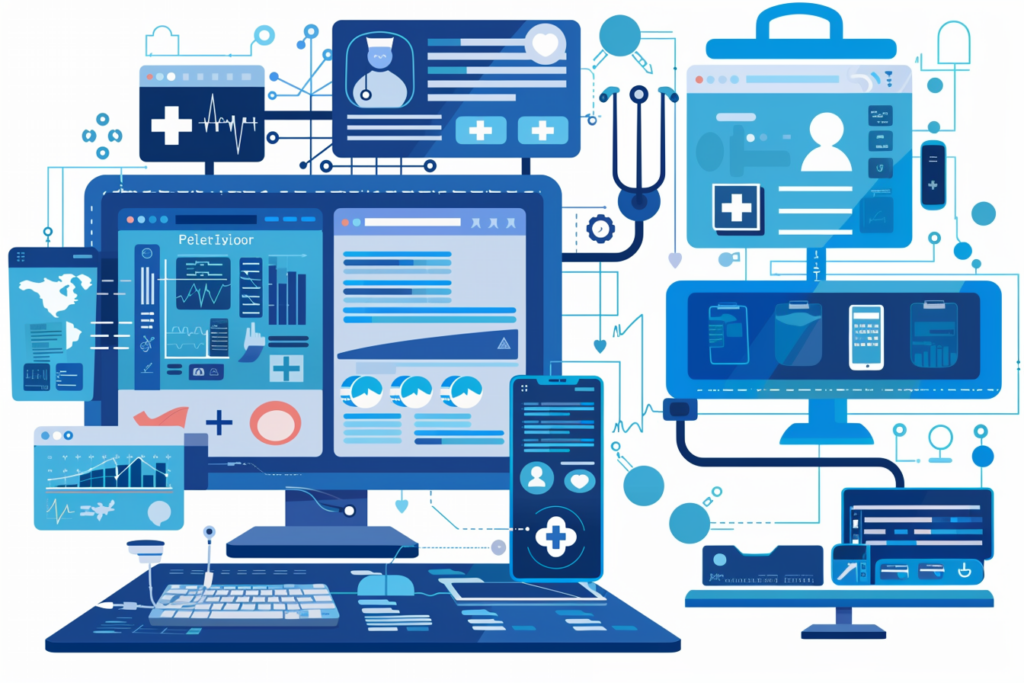
Every patient’s medical history is a unique composition. EHR software acts as the digital score, storing a comprehensive record of a patient’s medical journey, including:
- Medical History: Detailed records of diagnoses, allergies, medications, and immunizations.
- Laboratory and Imaging Results: Centralized storage of test results for easy access and predictive analysis.
- Treatment Plans and Physician Notes: Detailed documentation of care plans and medical decision-making.
EHRs with AI ensure continuity of care by allowing authorized healthcare providers to access a patient’s medical history seamlessly, regardless of location. This fosters better collaboration, improves treatment planning, and reduces the risk of medical errors.
4.Health Tracking & Monitoring Apps
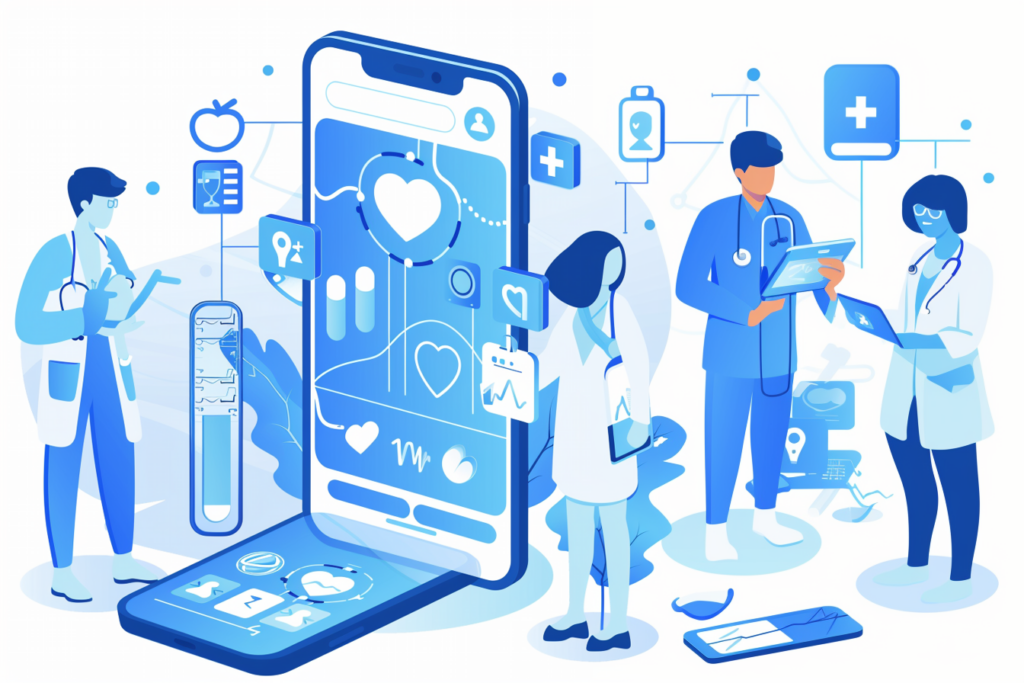
Technology has placed the power of health information directly into patients’ hands. Health tracking and monitoring apps allow individuals to:
- Track Vital Signs: Monitor heart rate, blood pressure, and sleep patterns, providing valuable insights into overall health.
- Manage Chronic Conditions: Record blood sugar levels, medication intake, and symptom tracking for conditions like diabetes.
- Connect with Healthcare Providers: Share data with doctors remotely, enabling proactive healthcare management.
These apps empower patients to take ownership of their health, allowing them to participate actively in their well-being and collaborate effectively with healthcare professionals. You can learn more about tracking applications in our case study.
5.Medical Billing Software
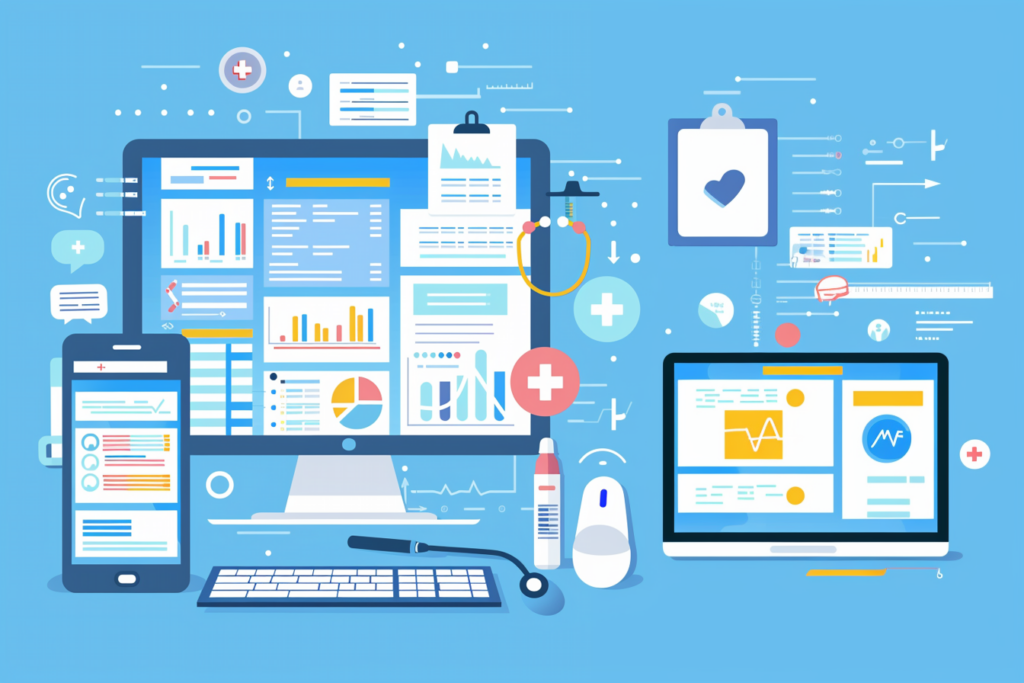
Accurate and efficient medical billing is the lifeblood of any healthcare facility. Medical billing software streamlines the entire billing process, including:
- Coding and Charge Capture: Automating the assignment of accurate medical codes to procedures and services.
- Claim Submission and Reimbursement Management: Electronically submitting claims to insurance companies and tracking reimbursements.
- Patient Billing and Payment Processing: Facilitating patient billing and offering various payment options for improved revenue collection.
Medical billing software minimizes errors, reduces administrative costs, and ensures timely payments, keeping the financial health of healthcare facilities in good standing.
6.Electronic Prescription Software (EPCS)

Gone are the days of illegible handwritten prescriptions. Electronic Prescription Software (EPCS) ensures accuracy and safety in medication prescribing by offering functionalities like:
- Electronic Prescribing: Doctors can electronically transmit prescriptions directly to pharmacies, eliminating errors in medication names and dosages.
- Drug Interaction Checks: The software for healthcare flags potential drug interactions, safeguarding patients from adverse reactions.
- Prescription Tracking and Monitoring: Allows for easier tracking of controlled substances and monitoring of patient medication adherence.
EPCS fosters safer medication practices, reduces the risk of errors, and improves communication between doctors and pharmacies.
7.Medical Imaging Software

Medical imaging has become an indispensable tool for diagnosis and treatment planning. Medical imaging software plays a critical role in managing and analyzing medical images, including:
- Image Acquisition and Storage: Facilitating the capture, storage, and retrieval of various medical images like X-rays, CT scans, and MRIs.
- Image Analysis and Interpretation: Offering advanced tools for radiologists and physicians to analyze images, detect abnormalities, and make informed diagnoses.
- 3D Visualization Tools: Providing advanced 3D visualizations of anatomical structures, aiding in surgical planning and patient education.
Medical imaging software empowers healthcare professionals with a clearer view of the human body, leading to more accurate diagnoses and improved patient outcomes.
8.Medical Diagnosis Software

While the human expertise of doctors remains irreplaceable, medical diagnosis software can be a valuable tool to support clinical decision-making:
- Decision Support Systems: Integrating patient data with medical knowledge bases to suggest potential diagnoses and treatment options.
- Differential Diagnosis Tools: Aiding doctors in considering various possible diagnoses based on a patient’s symptoms and medical history.
- Clinical Risk Assessment Tools: Identifying patients at higher risk for specific diseases, allowing for preventive measures and early intervention.
Medical diagnosis software serves as a helpful assistant to doctors, enhancing their diagnostic accuracy and expediting the path to better patient outcomes.
9.Medical Equipment Management Software
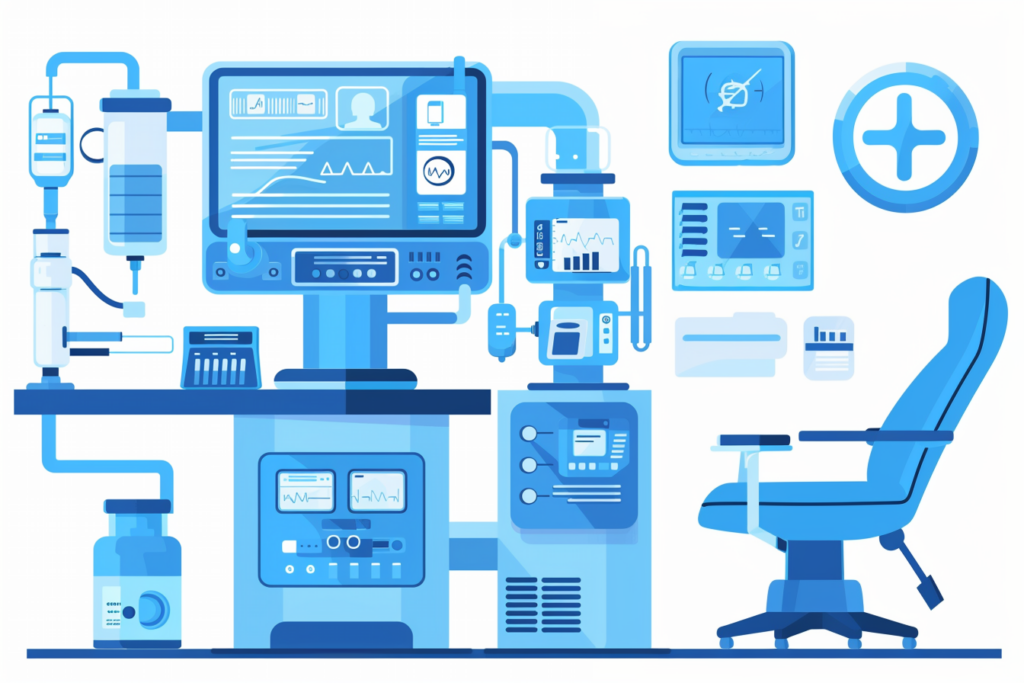
Hospitals rely on a vast array of medical equipment, and ensuring its proper functioning is paramount. Medical equipment management software acts as the orchestra’s tuner, offering functionalities like:
- Equipment Inventory Management: Tracking and maintaining an accurate inventory of medical devices.
- Preventative Maintenance Scheduling: Scheduling regular maintenance to avoid equipment malfunctions and ensure optimal performance.
- Calibration and Compliance Tracking: Monitoring equipment calibration and ensuring adherence to regulatory standards.
This software for healthcare helps hospitals maximize equipment uptime, minimize repair costs, and prioritize patient safety through well-maintained equipment.
10.VR Training & Simulation
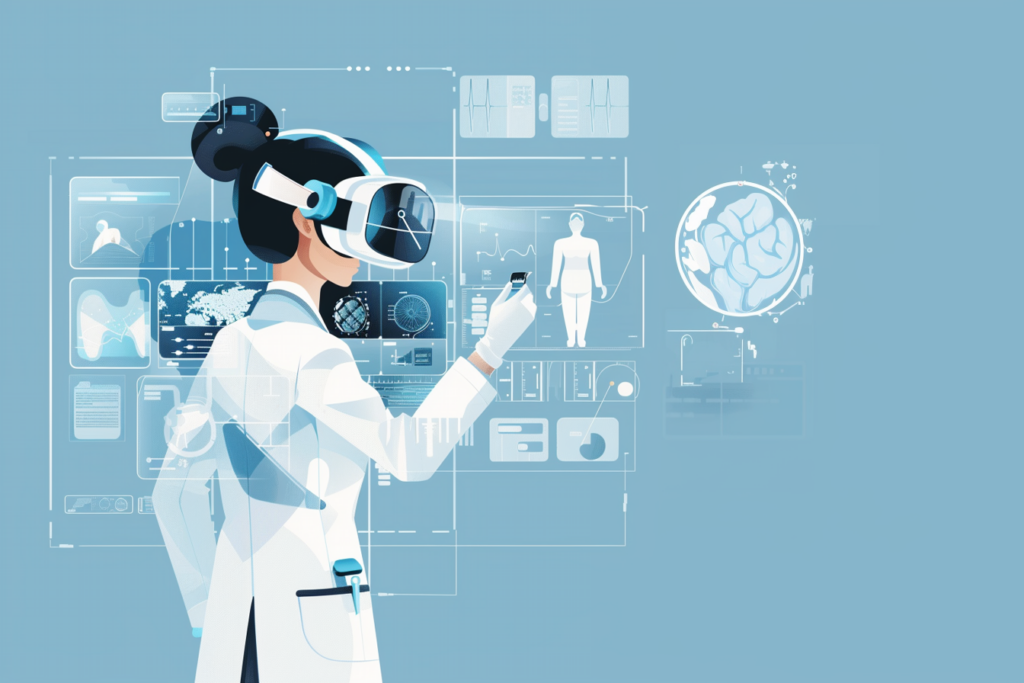
Medical professionals require continuous training to stay abreast of the latest advancements and procedures. VR training and simulation software offer an immersive and interactive platform for:
- Realistic Surgical Simulations: Surgeons can practice complex procedures in a virtual environment, improving their skills and decision-making in a risk-free setting.
- Medical Scenario Training: Healthcare professionals can practice responding to various medical emergencies, enhancing their preparedness and patient care skills.
- Anatomy Visualization: Students and medical professionals can explore the human body in 3D, fostering a deeper understanding of anatomy and physiology.
VR training offers a safe, engaging, and cost-effective way for healthcare professionals to hone their skills and ensure they are always in peak performance mode.
11.Telemedicine Software

Telemedicine software using AI allows healthcare professionals to connect with patients remotely, extending the reach of medical care:
- Virtual Consultations: Doctors can conduct consultations with patients via video conferencing, improving access to care for patients in remote areas or with mobility limitations.
- Post-Operative Care and Follow-Ups: Telemedicine facilitates convenient post-operative check-ins and follow-up appointments, reducing the burden on patients and healthcare facilities.
- Mental Health Services: Teletherapy sessions allow patients to receive mental health care remotely, addressing a growing need and reducing the stigma associated with seeking help.
Telemedicine software expands access to quality healthcare, fosters patient convenience, and creates a more efficient and flexible healthcare delivery system.
12.Customer Relationship Management (CRM) Software
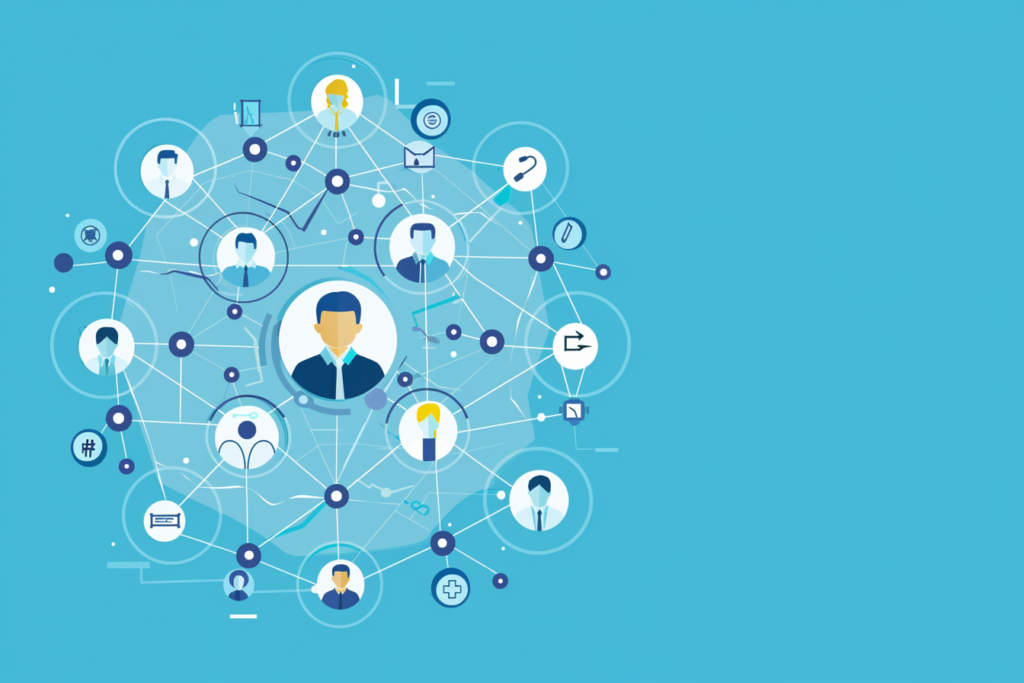
The patient experience is a crucial aspect of modern healthcare. CRM software helps healthcare facilities nurture strong relationships with patients by offering features like:
- Appointment Reminders and Patient Communication: Sending automated appointment reminders and informing patients about wait times and billing procedures.
- Patient Feedback Management: Gathering and analyzing patient feedback to improve service delivery and patient satisfaction.
- Personalized Communication: Tailoring communication to individual patient needs and preferences.
13.Health Tracking Apps (Revisited)
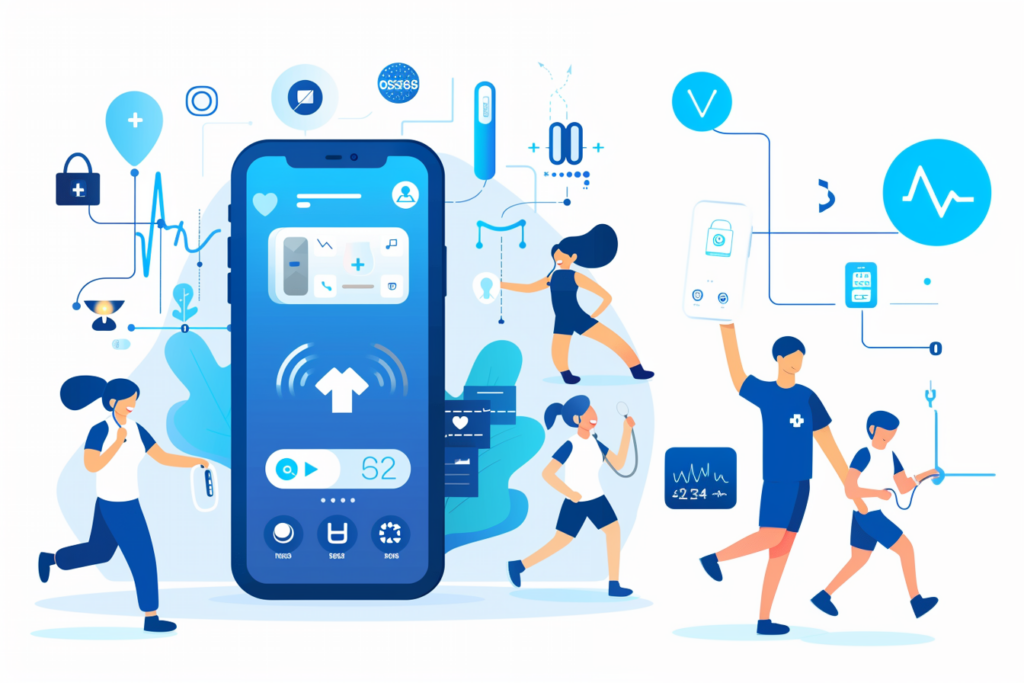
We previously explored the role of health-tracking apps, but it’s worth reiterating their significance in the overall healthcare symphony. These apps empower patients to:
- Monitor Daily Activity Levels: Track steps taken, calories burned, and sleep patterns, providing valuable insights into overall health and fitness.
- Manage Chronic Conditions: Allow patients with diabetes or other chronic conditions to monitor vitals, medication adherence, and symptoms, promoting self-management and early intervention.
- Connect with Healthcare Providers: Enable patients to remotely share health data with doctors, facilitating proactive care and medication adjustments.
Best Healthcare Software Used By Hospitals
Here’s a list of the top medical software programs used by hospitals, along with a short description of each:
Epic: A comprehensive electronic health record (EHR) system that offers a wide range of functionalities, including patient scheduling, billing, and population health management.
Oracle Health: Provides a suite of healthcare information technology (IT) solutions, including electronic health records (EHRs), revenue cycle management, and analytics.
Allscripts: Another leading provider of EHR systems, offering a cloud-based platform designed to be user-friendly and scalable.
Teladoc: A telemedicine company that provides hospitals with the ability to offer virtual consultations to patients.
Ohmd: A remote patient monitoring company that provides hospitals with the tools to monitor patients’ health remotely.
BioIntelliSense: A wearable biosensor technology company that provides hospitals with the ability to monitor patients’ vital signs remotely.
Athenahealth: A cloud-based EHR system specifically designed for ambulatory practices.
Nethealth: A suite of healthcare IT solutions, including electronic health records (EHRs), population health management, and revenue cycle management.
VisualDx: A clinical decision support tool that helps healthcare providers diagnose diseases by providing them with access to a large library of medical images.
Conclusion
The healthcare software industry is no longer a supporting act; it’s playing the lead role in transforming healthcare delivery. This dynamic ecosystem pulsates with innovation, orchestrating a seamless flow of data, communication, and care across the entire medical landscape.
At its core, the industry revolves around Electronic Health Records (EHRs). These comprehensive systems, like Epic, act as the central nervous system, ensuring patient data is accessible and organized across various providers. This fosters continuity of care and facilitates a more holistic approach to patient well-being.



